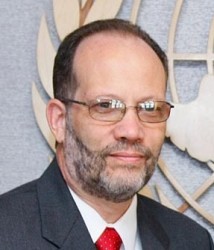The Caribbean Community (Caricom) yesterday renewed its call for the removal of the United States embargo on Cuba.
“Caricom knows well the value of unity on the international front given that co-ordination of foreign policy is one of the pillars of our integration movement,” Secretary-General Irwin LaRocque said as he accepted the credentials of Cuba’s envoy, Ambassador Julio César González Marchante, a release from the Caricom Secretariat said.
“We have, as a bloc, joined with like-minded states to both advance and protect our interests

and support causes and initiatives of priority concern to us. This is why we have consistently supported United Nations resolutions aimed at ending the U.S. embargo on Cuba and will continue to do so,” LaRocque said.
The Secretary-General described the decades-old diplomatic relations with Cuba as “a trailblazer in South-South Cooperation” highlighted by summits every three years and meetings of foreign ministers.
He said that these high-level political encounters provide opportunities to discuss areas of mutual interest and cooperation which extend to mutual support in the hemispheric and international arenas.
LaRocque noted that the success of Cuba-Caricom relations has been seen in technical cooperation in areas such as health, culture, language translation, natural disasters, and in agriculture. A significant area of cooperation he pointed out was human resource development in the community.
He lauded Cuba for being “by far the largest contributor” among the international partners of Caricom, as a result of the number of scholarships.
“As you help to build our capacity, your country, despite its constraints, has continued to supplement our human resource needs, particularly in the health sector, with the deployment of doctors and nurses in the community. This invaluable and highly appreciated assistance has also been extended in the fields of education, sports, agriculture, and culture,” he said.
As Cuba-Caricom relations evolve, he said other possible areas of collaboration and cooperation on the international front include the fight against non-communicable diseases, climate change and the implementation of the United Nations Arms Trade Treaty. These areas, Ambassador LaRocque noted, lend themselves to the two parties working together for the “best possible solutions,” the release said.
The Secretary-General also lauded Cuba on its successful Pro-tempore Chairmanship of the Community of Latin American and Caribbean States (Celac) which saw several issues of importance to Caricom being addressed at the summit in Havana last January.
“These included recognising the special circumstances of small developing middle-income countries, reparations for native genocide and slavery, the role of information and communication technology in development, climate change and disaster preparedness, to name a few. All of these are topics actively being pursued on the community’s programme of work,” LaRocque stated.
He affirmed the community’s “full support” of Cuba’s call for inclusiveness in consideration of issues related to the UN Post-2015 Development Agenda.
“It is my hope that we all take an active role in this global dialogue which will decide the future beyond the global development compact represented by the Millennium Development Goals. We must ensure that our Region’s interests are adequately and effectively addressed,” the Secretary-General said.





